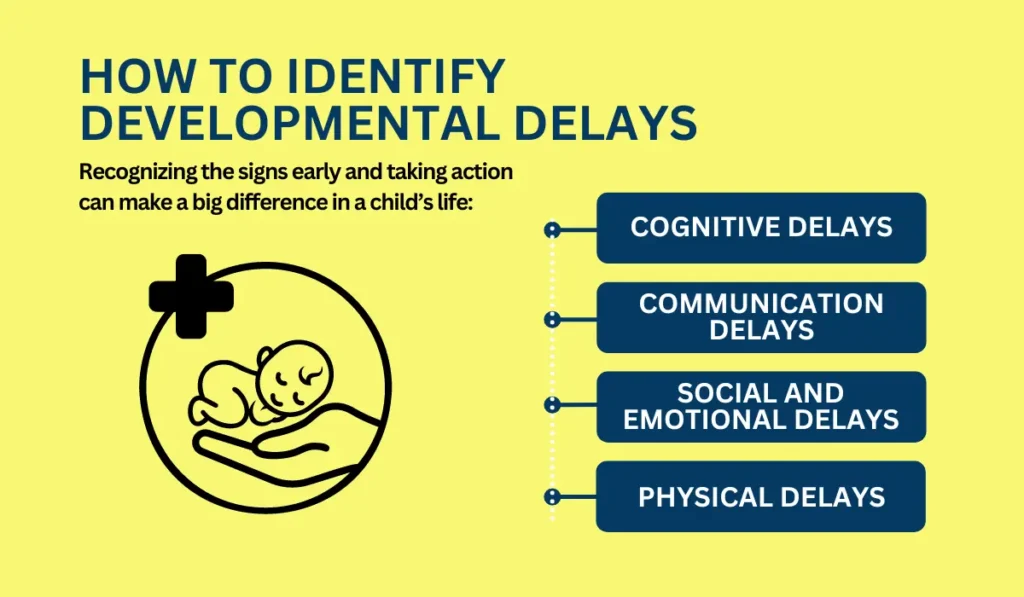Did you know that one in six children has developmental delays? Catching these issues early is crucial, as it ensures your child gets the help they need.
In today’s post, we’ll explore key developmental stages, share tips on supporting your child’s progress, and explain when to seek professional help. That way, you can manage developmental delays and ensure your child stays on track.
Key Takeaways
- Knowing the main stages—infancy, toddler, and preschool—helps spot issues in physical, cognitive, and social/emotional skills.
- Home health care providers are essential for tracking and supporting children’s milestones.
- Early detection and intervention for delays in thinking, talking, social skills, and physical abilities lead to better outcomes.
- Routines and consistency create a secure and predictable home for child growth and development.
What Are Developmental Milestones?
Developmental milestones are specific skills or behaviors most children can achieve by certain ages.
These benchmarks help parents and caregivers track progress in motor skills, communication, cognitive abilities, and social/emotional development. Examples include a baby’s first steps, first words, and playing games like peek-a-boo.
Knowing these milestones gives insights into child development and helps you understand if extra support is needed. They also help parents provide age-appropriate activities to boost growth.
Key Milestones in Childhood Development
Infants (0-12 months)
- Physical: A baby’s development starts with rolling over, crawling, and taking their first steps. Here, they develop better hand-eye coordination, letting them reach for and grasp objects.
- Cognitive: They begin recognizing sounds, babbling, and saying their first words (e.g., “bye-bye,” “dada,” “mama,” etc.). They understand cause and effect, solve problems like finding hidden objects, and develop memory skills.
- Social/Emotional: Babies start smiling, waving goodbye, and showing preferences for certain people. They form attachments to caregivers, express emotions, and engage in simple social interactions.
Toddlers (1-3 years old)
- Physical: Toddlers run, climb up and down stairs, and balance on one foot, building strength, coordination, and fine motor skills.
- Cognitive: They follow multi-step instructions, identify shapes and colors, and engage in imaginative play. They recognize patterns and begin basic counting and sorting activities.
- Social/Emotional: Toddlers play interactive games, show affection through hugs and verbal expressions, and begin toilet training, reflecting their developing social skills and emotional awareness.
Preschoolers (3-5 years old)
- Physical: Preschoolers engage in more complex activities like hopping, skipping, and climbing. Overall, they show enhanced motor skills, balance, and coordination.
- Cognitive: They move from basic recognition to advanced tasks like counting and early reading, laying a solid foundation for future learning.
- Social/Emotional: Preschoolers learn to share, cooperate, imitate, and understand rules, which are crucial for their emotional development and effective interaction.
How to Identify Developmental Delays

Every child grows at their own pace, but sometimes delays can impact their development. Recognizing the signs early and taking action can make a big difference in a child’s life:
- Cognitive Delays: Difficulty learning new skills, problem-solving, and showing curiosity.
- Communication Delays: Limited vocabulary, trouble forming sentences, and difficulty understanding instructions.
- Social and Emotional Delays: Challenges interacting with peers, managing emotions, and lacking interest in playing with others.
- Physical Delays: Trouble with fine motor skills (like holding a pencil/crayon or scribbling), gross motor skills (like walking or running), and coordination.
Knowing these potential challenges helps parents and caregivers support their child’s development at every stage.
How Home Health Care Providers Can Help Monitor Development
Being a parent and a caregiver can be difficult. So, in light of these developmental challenges, home health care providers can play a crucial role in monitoring and supporting children’s growth.
They use various tools and checklists to keep track of progress and catch any potential delays (or even disabilities) early on.
Their key responsibilities are to:
- Monitor developmental milestones
- Identify potential delays
- Create personalized childcare plans
- Implement tailored interventions
- Communicate with families
- Educate and empower parents
These professionals can offer personalized care plans and interventions tailored to each child’s unique needs, ensuring they receive the necessary support to reach their full potential.
How Can Parents and Home Health Care Providers Collaborate?
Working together to address developmental delays is essential for parents and home health care providers. Here are strategies to strengthen this partnership:
- Regular Communication: Maintain open and consistent communication with healthcare providers. This allows you to share observations and overall progress.
- Individualized Plans: Develop and implement personalized care plans that address the child’s specific needs. They’ll need your insight for this process. As a note, healthcare costs can be covered here.
- Monitoring Progress: Regularly review the child’s development and adjust strategies as needed to ensure continuous improvement.
Remember, early intervention is crucial. Promoting early intervention services can greatly improve outcomes for children with developmental delays.
Supporting for Parents and Families
The home plays a central role in nurturing a child’s development. Therefore, you should actively incorporate specific practices into daily life.
Establishing routines and maintaining consistency gives children a sense of security and predictability, fostering a safe exploration and learning environment.
Here are some ideas to consider:
- Set Regular Meal Times: Ensuring consistent meal times supports a healthy diet and digestion.
- Bedtime Routine: A regular bedtime routine, including activities like brushing teeth, reading a story, or quiet time, promotes better sleep habits.
- Study Time: Designating a specific time each day for homework or educational activities helps cultivate a habit of learning.
Maintaining routines and consistency can create a stable environment supporting your child’s growth and development.
| Please note that the content provided on this blog is for informational purposes only and is not intended as medical advice. Always consult a healthcare professional before making any decisions about your health. |